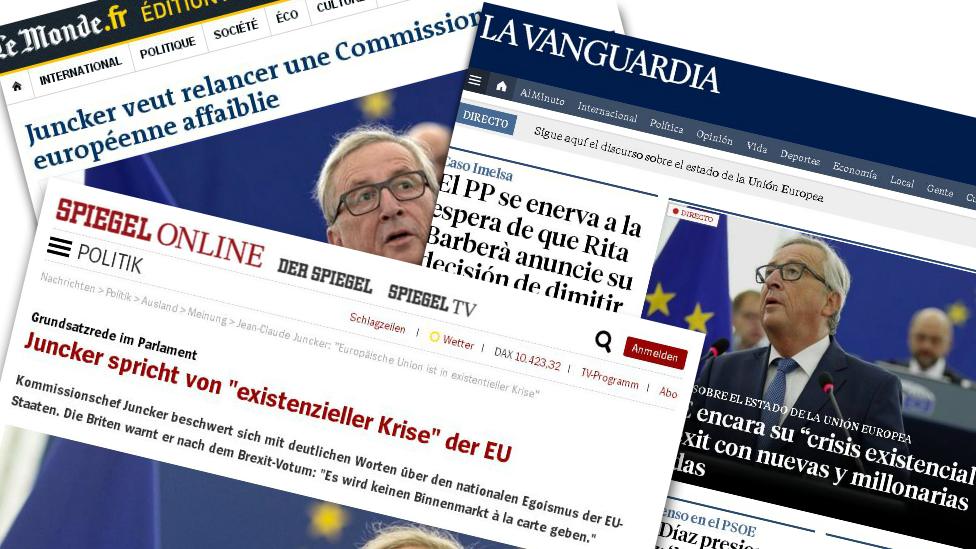Brexit: Juncker fails to impress Europe's media
- Published

Online front pages highlighted Mr Juncker's words about the EU's "existential crisis"
European newspapers have been debating the future shape of post-Brexit Europe this week - and some are not sure European Commission President Jean-Claude Juncker's widely expected state of union address offered many answers.
In Germany's Sueddeutsche Zeitung, external (all links here are to foreign-language websites), Lilith Volkert is not impressed by Mr Juncker's remarks.
"If this is supposed to be a galvanising speech, then it's extremely timid stuff," she says, accusing him of "peddling a pretty little assortment of goods" that "do not touch on Europe's big problems" such as Brexit or the refugee crisis.
But French daily Le Monde, external's Brussels correspondent at least sees in Mr Juncker's address on Wednesday a "striking" contrast to what it calls his "vindictive" berating of member states over the refugee crisis in last year's speech.
German news magazine Der Spiegel, external thinks Mr Juncker used "clear words" to condemn EU member states' "national egoism".

"Europe needs a 'wow' from Juncker," - Germany's news magazine Spiegel
In the run-up to Mr Juncker's speech, newspaper commentators had advice ready for Mr Juncker on the path ahead for after Brexit.
Spiegel journalist Peter Mueller demanded, external that Mr Juncker offer solutions to "people's concrete concerns, such as tax justice", instead of "cloud-cuckoo-land ideas such as that of a common European army".
'Not stretchpants'
In German paper Die Welt, external, British-German commentator Alan Posener urges Mr Juncker to "listen to the wisdom of the people" and realise that the EU is not "an end in itself".

"Will the EU begin to lose freedom without Britain?", wonders Czech daily Lidove noviny
"More Union and more Europe are not automatically the solution for all problems," he warns, adding that Mr Juncker should also accept more diversity of opinion: "One-size-fits-all doesn't work. The EU is not a pair of stretch pants."
In the wider debate on the EU's future without Britain, Czech commentator Jan Machacek worries that the EU may be losing its "main proponent of freedom and classical free-market liberalism".

"In that case, better to dissolve the EU and create it anew," says Germany's Die Welt
Instead, it will now be dominated by French "statism and bureaucracy" and German "order", he argues in an article in Lidove noviny, external. "Seriously, can France and Germany ever be a beacon of freedom?"
Back in Die Welt, external, commentator Christian Schiltz tables a drastic solution to the EU's problems: "Dissolve it and create it anew".
This, he says, may be the only answer if "egoism, freeloading, the formation of blocs and refusal to reform continue to dominate the union" - "an EU II, with fewer members, new rules and tamed pathos would be preferable".
In Le Monde, external, the head of France's main employers' federation, Loic Armand, is less radical, but urges a more transparent, realistic and collaborative EU that recognises the limits of its institutions and focuses on areas where it can make difference, such as competitiveness.
Brexit, he argues, has ended the "great lie" the ever closer union between peoples was anything more than an ambition on paper.
'Painful compromises'
Press commentators also continue to debate the likely shape of Brexit negotiations.
In Frankfurter Allgemeine Zeitung, external, economics correspondent Marcus Theurer voices unease at the apparent gulf between British demands for immigration controls and the EU's "no cherry-picking" approach to UK single market access
"Brexit will require pragmatic but painful compromises from both sides," he warns.
But Polish economist Witold Orlowski, in Rzecspospolita, external, voices relief that Brexit has not caused an immediate economic breakdown.
In the long run, "we will all be poorer and less safe", he thinks, "but the costs will not appear overnight".
BBC Monitoring reports and analyses news from TV, radio, web and print media around the world. You can follow BBC Monitoring on Twitter, external and Facebook, external.